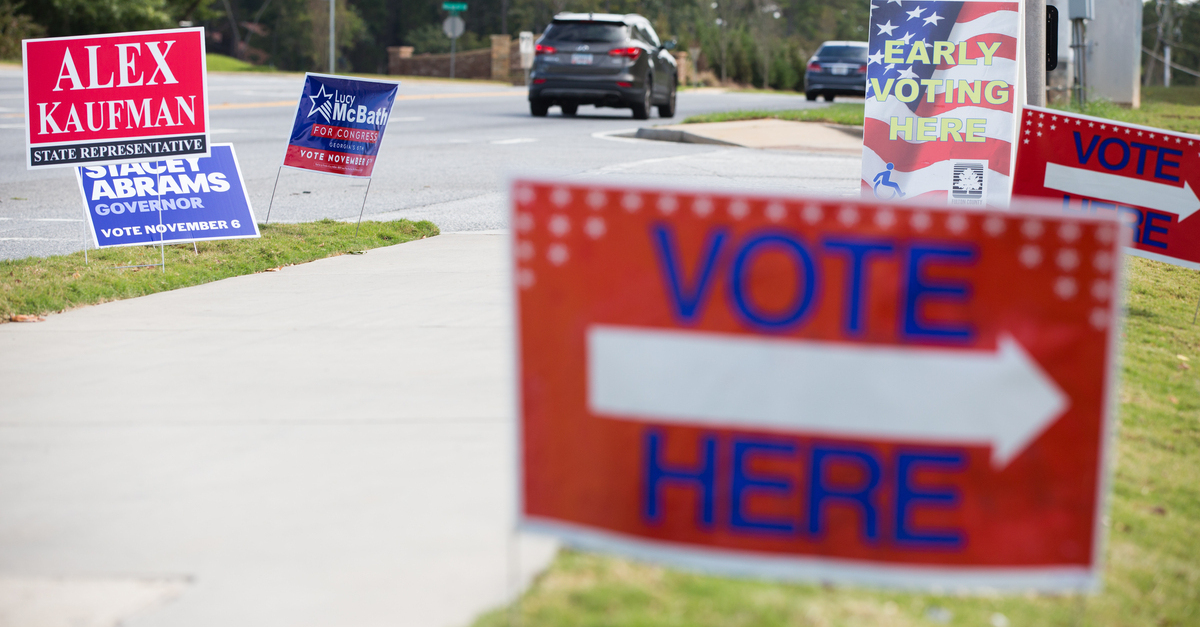
Voters and voting rights advocates notched a significant legal victory in Georgia after reaching a settlement in federal court.
Attorney Marc E. Elias noted the upshot of the legal denouement: “Under the terms of a new settlement, Georgia must quickly notify voters when their absentee ballots are rejected, allowing them time to correct problems and have their ballots counted.”
Per the terms of that agreement, election authorities–administered by the secretary of state’s office–must immediately contact voters if their absentee ballots are rejected or otherwise invalidated.
The settlement outlines two distinct time periods for officials to make contact with voters if a rejection occurs: (1) if a voter’s ballot is rejected 12 or more days prior to an election, the voter must be contacted within three business days via email, phone, and regular mail; (2) officials must contact a voter if his or her ballot is rejected eleven days before election day by the next business day using the same methods.
Here’s how the settlement explains things in legalese:
When a timely submitted absentee ballot is rejected, the board of registrars or absentee ballot clerk shall send the elector notice of such rejection and opportunity to cure, as provided by O.C.G.A. § 21-2-386, by mailing written notice, and attempt to notify the elector by telephone and email if a telephone number or email is on the elector’s voter registration record, no later than the close of business on the third business day after receiving the absentee ballot. However, for any timely submitted absentee ballot that is rejected on or after the second Friday prior to Election Day, the board of registrars or absentee ballot clerk shall send the elector notice of such rejection and opportunity to cure, as provided by O.C.G.A. § 21-2-386, by mailing written notice, and attempt to notify the elector by telephone and email if a telephone number or email is on the elector’s voter registration record, no later than close of business on the next business day.
“A huge victory for all Georgians, this decision further secures each citizen their constitutionally guaranteed right to the ballot box,” Georgia Democratic Party Chair Nikema Williams said in a statement.
The legal battle stemmed from the fiercely fought and highly disputed 2018 gubernatorial contest between Democratic Party rising star and centrist Stacey Abrams and GOP winner Brian Kemp. Abrams ran an uncharacteristically progressive-sounding campaign.
Widespread voting irregularities and voter suppression plagued that contest and marred Kemp’s razor-thin victory over Abrams. The somewhat dubious circumstances and allegations of intentional disenfranchisement prompted the losing Democrat to refuse to acknowledge Kemp as the “legitimate” governor of the Peach State.
“[W]hat you are looking for me to say is that there was no compromise of our democracy, and that there should be some political compromise in the language I use, and that’s not right,” Abrams told CNN after ending a long-shot legal challenge. “What’s not right is saying something was done properly, when it was not.”
Kemp termed voter Abrams’s allegations a “farce.”
Specific to the now-settled lawsuit were 8,157 absentee ballots tossed by Kemp’s office from fast-trending red-to-blue Gwinnett County. Kemp, now the governor, somewhat controversially oversaw election administration as Georgia’s then-secretary of state–the office he held as he was running for an elected promotion to governor in 2018.
Despite hours-long lines, Abrams won Gwinnett County by substantial margins in 2018. Democrats pegged their hopes to victory on absentees turning things around there.
A separate lawsuit filed by voters determined Gwinnett County officials violated the Civil Rights Act by improperly rejecting absentee ballots solely on the basis of missing or incorrect birth years.
Friday’s resolution of the other lawsuit–filed by the Democratic Party–offers Democrats substantial hope in the now-purple State of Georgia.
“Every Georgian should have the right to cast their vote and make sure it counts,” Williams told the Atlanta Journal-Constitution when the lawsuit was originally filed in early November 2019. “Our elections need clear and fair standards to ensure that no one is disenfranchised and that no community is unfairly targeted.”
Read the full settlement agreement below:
Georgia Absentee Ballots Settlement by Law&Crime on Scribd
[Image via Jessica McGowan/Getty Images]